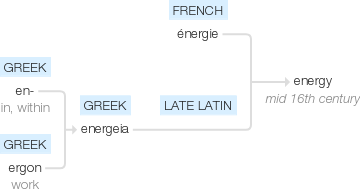Energy
mid 16th century (denoting force or vigour of expression): from French énergie, or via late Latin from Greek energeia, from en- ‘in, within’ + ergon ‘work’.
wiktionary
From Middle French énergie, from Late Latin energia, from Ancient Greek ἐνέργεια(enérgeia, “activity”), from ἐνεργός(energós, “active”), from ἐν(en, “in”) + ἔργον(érgon, “work”). The sense in physics was coined by Thomas Young in 1802 in his lectures on Natural Philosophy.
etymonline
energy (n.)
1590s, "force of expression," from French énergie (16c.), from Late Latin energia, from Greek energeia "activity, action, operation," from energos "active, working," from en "at" (see en- (2)) + -ergos "that works," from ergon "work, that which is wrought; business; action" (from PIE root *werg- "to do").
Used by Aristotle with a sense of "actuality, reality, existence" (opposed to "potential") but this was misunderstood in Late Latin and afterward as "force of expression," as the power which calls up realistic mental pictures. Broader meaning of "power" in English is first recorded 1660s. Scientific use is from 1807. Energy crisis first attested 1970.
